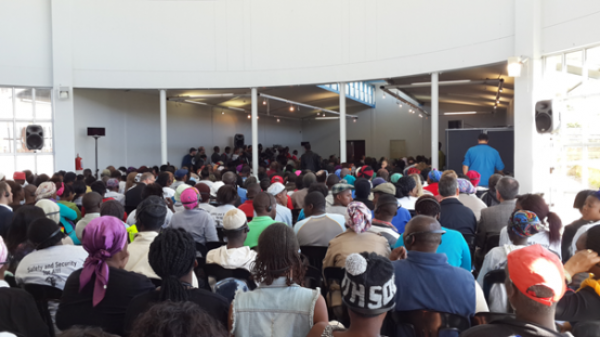Khayelitsha report: community wants to understand the recommendations

Residents of Khayelitsha queried some of the recommendations made by the Khayelitsha commission of inquiry into policing. Others did not understand exactly what the commission has recommended.
On 25 August at Lookout Hill in a hall packed with people from Khayelitsha, the commission handed over its final report to Western Cape Premier Helen Zille.
Some of the community members said that they were impressed by Zille’s speech, even though they disagreed with things she said.
According to the commission there are more than 1,400 illegal shebeens in Khayelitsha. Although Zille said the community would be surveyed how to best deal with the shebeen situation, some in the hall understood the premier to be suggesting that all the unregistered shebeens should be closed down because they had an influence on the high levels of crime in the area.
Masa Nkawule from Site B said that he is pleased the commission has suggested, among other things, that there should be a police station in Makhaza, but he was unhappy about what Zille said about alcohol abuse in Khayelitsha.
“I do support the closing of illegal shebeens, but then I do not support the statement the premier made that alcohol is one of the main influences of crime in the area,” said Nkawule.
“I believe that most people who do crime are not those drunk on alcohol, but those who are on drugs. I did not hear her [Zille] saying much on the drug problem in the area. Most of the kid gangsters use drugs, and that is not properly investigated.”
Nothemba Ntaba, who owns an unlicensed shebeen, said that if the premier wants to close down all illegal shebeens, then she will have to find jobs for the people or some means of financial support.
“I don’t have work and I have employed people to work for me. So my question would be, what would happen to myself and those people. I know that selling alcohol might not be a perfect job but it brings food for my family.”
“I think that the police should actually do their jobs and patrol more often, and also close down shebeens at a certain time, but not by interrogating us and illegally taking our money and alcohol,” said Ntaba.
Thembakazi Naku from Site C said that the recommendations were good, but at the same time she was greatly disappointed that the commission only suggested a new police station in Makhaza.
“I do not agree that the police station should be only built in Makhaza. Site C also has a huge problem with crime and gangsters,” said Naku. “We have to go to Site B to report crimes and that costs. We are unemployed and we sometimes have to walk a long distance to get to the Site B police station. Sometimes the police do not even respond to us.”
Anele Sotyeba from Makhaya agrees with the commission that the police do not do regular checks in the area.
But, he said, “We have to consider the fact that there are places like Enkanini in Khayelitsha that has no roads and it’s difficult for the police to reach those areas. And also that the police are sometimes scared of the gangsters and that could be the reason why you see less of them in the hot spots.”
Sonwabo Mpahla from Harare said that he didn’t understand most of the things that were said at the commission. “I hope the commission or organisations that are involved will have meetings with different communities to discuss the recommendation and to simplify them so that local people can understand.” Mpahla believes that most people from Khayelitsha who were at the release of the report did not understand exactly what the recommendations meant.
Support independent journalism
Donate using Payfast

Don't miss out on the latest news
We respect your privacy, and promise we won't spam you.
Next: Khayelitsha police not trained to deal with domestic violence
Previous: Hospital confirms Philippi protester had bullet wound

This article is licensed under a Creative Commons Attribution-NoDerivatives 4.0 International License.
